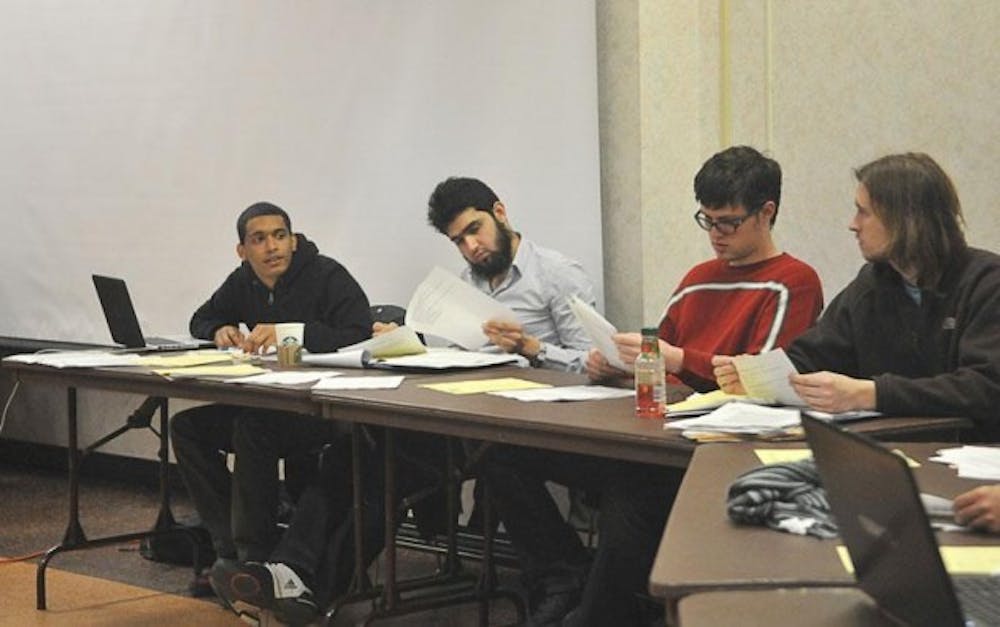Just when it appeared that the Student Association Senate would finally take definitive action regarding the InterVarsity Christian Fellowship, the Senate postponed its ultimate decision once again.
The InterVarsity Christian Fellowship (IVCF) had until Saturday to stop requiring its officers to subscribe to a Christian "basis of faith" – which a Senate committee announced on Jan. 29 to be in violation of university and SA anti-discrimination policy – by amending its constitution. IVCF did not do so, and instead of derecognizing the club, the Senate on Sunday extended IVCF's deadline to April 4.
The Senate also postponed the process at the end of last semester, when it gave the committee until the first meeting of the spring to arrive at a decision.
All the while, IVCF continues to function normally, because although the SA has frozen the club's budget ($6,000 in student mandatory activity fee money at the beginning of the year), the club is receiving donations from churches, according to IVCF Outreach Coordinator Quinten Hall-Lochmann Van Bennekom.
The Senate began to investigate IVCF's constitution after the club's former treasurer, SA Assembly Speaker Steven Jackson, accused IVCF last semester of forcing him to resign because he is gay.
The Jan. 29 Senate mandate did not specify what action the body would take toward IVCF if the club failed to properly amend its constitution, as it only listed derecognition as a possibility. A Senate resolution adopted on Sunday, though, stipulates that if the basis of faith is still not removed by April 4, senators will vote on whether to derecognize IVCF.
"We were surprised to see [the deadline] extended," Van Bennekom said. "We did not expect more time."
IVCF, the Buffalo chapter of the national InterVarsity Christian Fellowship, did not amend its constitution because the national organization's lawyers do not believe IVCF violates UB or SA policy by requiring its leaders to subscribe to the basis of faith.
"We deemed it necessary that [the basis of faith] be in there to ensure that our leaders for future generations…could represent adequately what IVCF believes in…We felt that by taking that out, we over time dilute our leadership and essentially our identity as a club," IVCF President Aaron Boucher told the SA Senate.
The debate centers largely on whether there is a difference between membership and leadership in a SA-funded club. The Senate committee deemed them to be one and the same. IVCF members feel differently – the club is open to anyone, but they think they should be able to require their leaders to adhere to Christian beliefs.
IVCF supporters have argued that a club such as the Muslim Student Association (MSA) wouldn't want a Christian student to be its president, just like IVCF wouldn't want someone who doesn't subscribe to the club's beliefs in a position of authority. But a Christian could be president of MSA if he were elected by the club's membership, as unlikely as that might be.
Jackson was elected as treasurer by IVCF's membership, but since his homosexuality clashed with certain verses in the Bible (which the IVCF's basis of faith holds as a supreme authority), he felt like he was forced to resign.
A letter from IVCF appears in today's Opinion section, fully explaining the club's position on the matter.
Almost all of the Senate's deliberation about IVCF on Sunday happened in a closed-to-the-public "executive session." It was the second executive session of the Senate meeting. Not everyone present agreed with the Senate's tactics.
"The Senate is essentially putting a club on trial, and the club at least has the right to be there while decisions are being made about it," said SA Environmental Affairs Director Paul Stephan, who also served as a proxy at the very end of the meeting. "These are our leaders. They were chosen to make these decisions; they should make these decisions out in the open and be very clear about why the decisions were made."
SA Senate Chair Darwinson Valdez agreed with Stephan, but he explained that there were legal issues.
"As the Senate chair, I'm not in favor of executive session at all," Valdez said. "But in this situation, we wanted to speak to our lawyer [to make sure we were making the right decision]. But from my side of the point, I always like open meetings, so I don't really like executive session."
Email: news@ubspectrum.com





